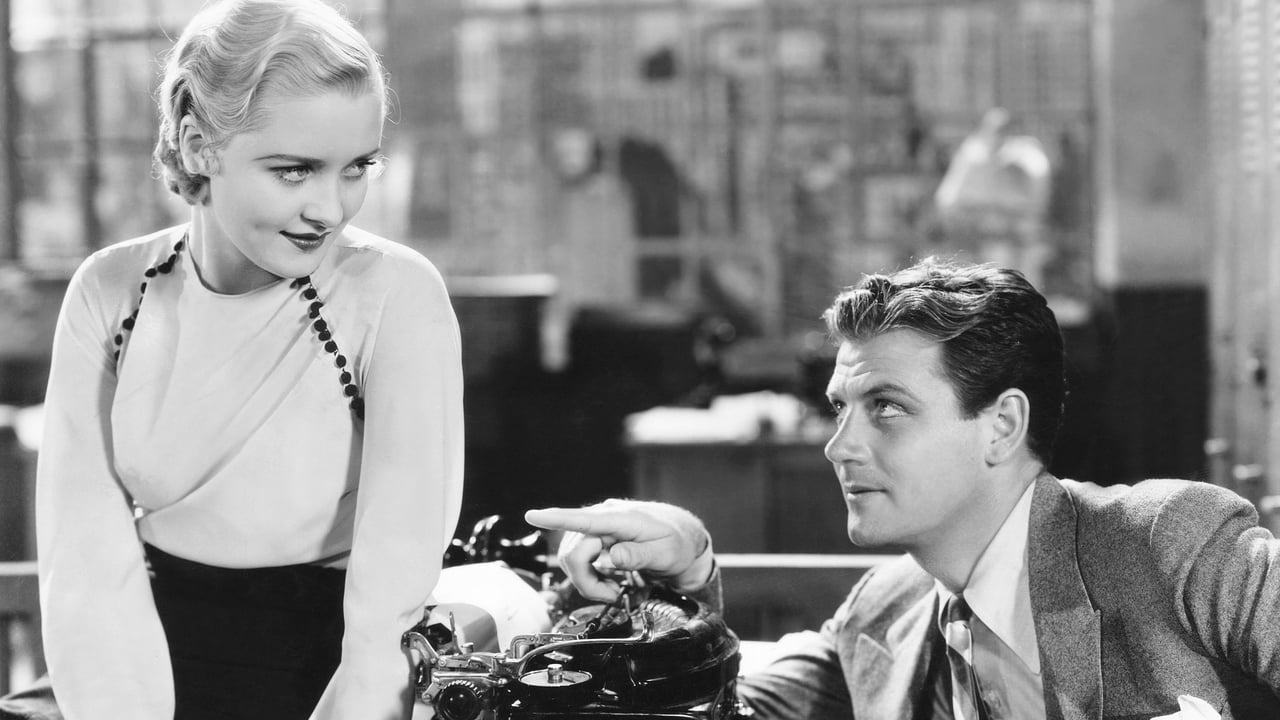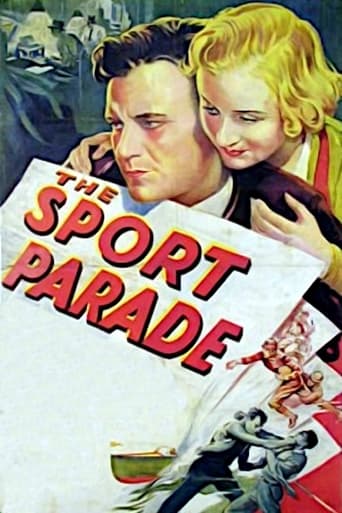MoPoshy
Absolutely brilliant
Arianna Moses
Let me be very fair here, this is not the best movie in my opinion. But, this movie is fun, it has purpose and is very enjoyable to watch.
Anoushka Slater
While it doesn't offer any answers, it both thrills and makes you think.
Lachlan Coulson
This is a gorgeous movie made by a gorgeous spirit.
GManfred
Not a lot of depth to "The Sport Parade". Truth be told, nowadays the theme would be called 'threadbare and hackneyed', nowadays being 85 years later. Two college athletes are bosom buddies bur take different paths after graduation. Johnny (William Gargan) has a reliable, steady job lined up and Joel McCrea plays Sandy, the grasshopper, who is pre-occupied with women and money. He signs up with a shady sports agent who indulges him and gets him into debt. Johnny comes to the rescue with a job, which Sandy takes, along with Johnny's girl friend.But they are buddies, and the movie points up the camaraderie and good feeling between the two. If it begins to sound familiar, it is - you've seen something similar before. You can see a youthful Joel McCrea, long and lean, and lovely Marian Marsh who may be unfamiliar to modern audiences. You can also get a glimpse of life in grandpa's time, with spectators in raccoon coats and straw hats, as well as long-gone manners and mores of polite company.My star rating is in the heading as the website no longer prints mine.
calvinnme
... and I mean both the figurative and literal scenery here. I started watching this because I'm a big fan of Joel McCrea, but ten minutes into it and the corny collegiate "contact" business between Dartmouth buddies Sandy Brown (Joel McCrea) and Johnny Baker (William Gargan) and I was rolling my eyes and thinking about hitting the erase button on the DVR. I'm glad I resisted the urge. Although the major plot themes are paint by numbers - big college sports stars are often wash outs after graduation, two best friends in love with the same beautiful girl, and with even the grasshopper and the ant fable thrown in for good measure, there are some things worth catching here.For one, the cast of supporting characters is great. There's Walter Catlett as a seedy agent, which is rich if you think about it since even though seedy was Catlett's on-screen trademark, in real life there was never a sweeter and more generous guy to a literal fault than he. Then there's Skeets Gallagher as a drunken newspaper photographer who either misses the photo or defocuses the lens due to his constant state of intoxication, yet manages to get the photo of a lifetime. Finally there's the splendid cameo appearance of Robert Benchley as an unnamed radio announcer with his trademark droll dry humor. He covers sports events and manages to get things completely wrong - even as to whether or not there is actually a band playing at a football game.Also look for a shot of a Cotton Club-like night club with a couple of numbers featuring an all African American cast - an odd sidetrack in a movie that is - if it is about anything - is certainly not about nightclubs.Finally, the homo erotic angle that is always played up in this film - William Gargan popping Joel McCrea with a towel in a shower after a football game, is really overshadowed by an anonymous gay couple as spectators at the fights complaining of the savagery of the event and leaving in disgust. Stereotypical - absolutely - but certainly an example of what would not be possible just two years later under the production code.A point of interest - one of the few times William Gargan did get the girl in a film was a year later when he made "Headline Shooter" ... with Joel McCrea's actual wife, Frances Dee.
marcslope
It is, after all, a very Hawksian landscape -- men's men, sports, best friends vying for the same woman, a vague homoeroticism beneath. (The film historian Richard Barrios has suggested it's a heavily disguised gay fantasy, with Marian Marsh there just for convention's sake.) But Dudley Murphy, with David Selznick's blessing, goes in for terrible artsy cinematic transitions, needlessly elaborate camera-work, and an odd obsession with Harlemites (a pseudo-Cotton Club sequence that makes for highly uncomfortable viewing today). You do get the appeal of the young Joel McCrea, one of the most unassuming and likable of leading men, and there are nice, seemingly improvised bits by Robert Benchley, doing sportscaster variations on his famed "Treasurer's Report" routine. Walter Catlett pitches in, too, playing a sort of sub-Don King with his well-practiced brand of cynicism and breathless delivery. But the pacing's sluggish for an under-70-minute programmer, and the happy ending's awfully forced: Aside from the inexplicably quashed romantic rivalry, wouldn't a sequel show the mob gunning down McCrea for not throwing the fight?
tmpj
This had to be schlocky, even for 1932. Two four letter athletes at Dartmouth graduate, and head down separate paths, one successful, one not. They meet again, wind up working at the same job, and fighting over the same chick. Are you snoring yet ? I am. The only reason to watch this one is to see early Joel McCrea, but he made better ones than this in his early career. Nuts to the "Sport Parade". This one probably didn't make the '32 "Hit Parade".

